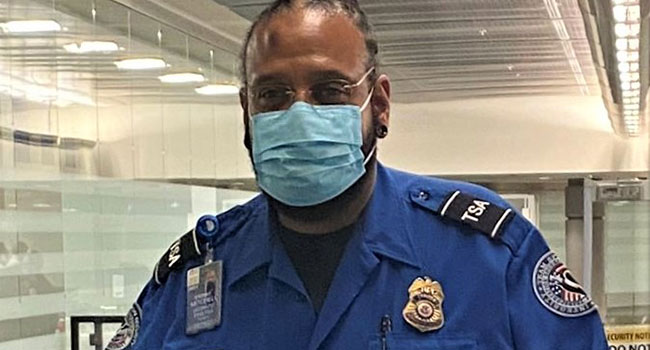
Richmond TSA Officer Recalls His Role at the World Trade Center After 9/11 Terrorist Attacks
Nineteen years ago, he was a police officer with the New Jersey State Department of Corrections and a member of the Special Emergency Response Team, so when terrorists attacked on 9/11, Leonard Mitchell “saw our brothers and sisters in blue in distress and I felt it was my duty to respond.”
Mitchell has worked for the Transportation Security Administration as a TSA officer for nearly seven years, first at Newark Liberty International Airport and more recently at Richmond International Airport for the past three years. He looks back on the tragic events of 9/11 with mixed emotions. What initially began as a rescue mission to help locate survivors in the rubble of the World Trade Center soon turned into a recovery effort. “Most people can never understand the devastation and destruction that took place at the World Trade Center that day,” he said.
Mitchell was assigned to assist with digging through the rubble to help find any possible survivors. “We worked digging through the rubble for the next three days, but no survivors were ever found.”
His next assignment was morgue detail at St. Vincent’s Hospital in New York City, a few miles from Ground Zero, where he was to transport body bags from the site of the attacks to the hospital for possible identification.
“The smell of death permeated the air. Body bag after body bag came in,” he said. “As we unloaded the remains, we all stood at attention and saluted. Tears fell almost every day. We worked around the clock. We gave up our vacations, personal time and days off to help work the site.” He worked that detail for three months. “It was a horrifying scene every day,” he said.
Mitchell’s emotions ran from anger toward the attackers to humiliation that the U.S. could be attacked in such a manner, to pride for his fellow volunteers who were coming together and gratefulness to complete strangers who stopped by the site to share food, extra clothing and words of encouragement as they worked. “I never felt more proud to wear the uniform” of a corrections police officer, he said.
As he reflected back to 2001, Mitchell said he thinks back to the men and women who he worked alongside at Ground Zero. Many passed away from illnesses contracted from breathing in the air at the site. Yet, he continues to stay in touch with some of his fellow officers who he worked with” during those sad days.
many bad memories,” he said.
After he retired as a corrections officer, Mitchell wanted to continue to serve and give back, which is why he joined TSA. “I wanted to continue to honor those who lost their lives and be the first line of defense so that a tragedy like that would never happen again. September 11th was my motivation to join TSA. I hope I can continue to live up to the memories of those who lost their lives on that Tuesday morning in September, 19 years ago.”